Growing up watching detective serials and movies, everyone wants to become a detective. The thrill of deducing never really leaves us especially after getting to know the character of Sherlock Holmes. However, somewhere along the way, we forget this dream of ours and work towards more “realistic” goals. In recent years, due to the increased rate of crime, there is a greater need for detectives to solve them. Thus, some police officers step up and exhibiting what Sherlock Holmes does. You will find some information about being a detective if you still want to become one.
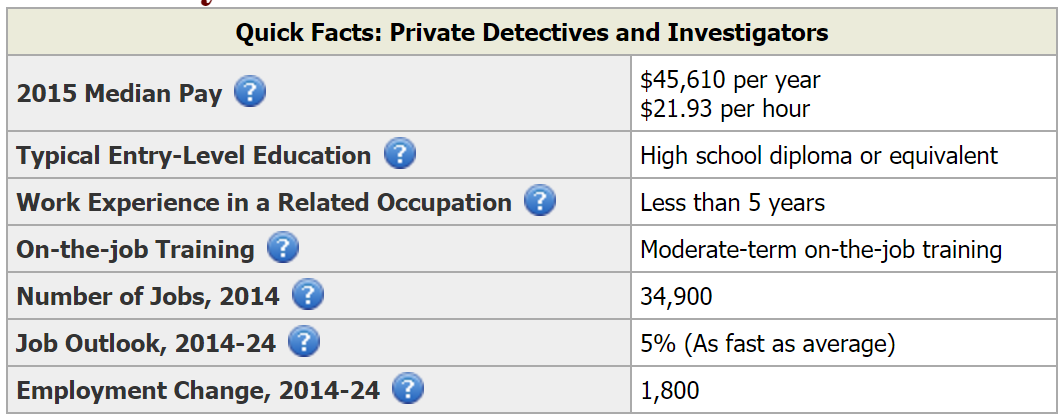

Table Of Contents
- Average Detective Salary
- Detective Career Outlook
- How To Become A Detective
- Detective Job Description
How Much a Detective Earns
The employer is the one who will decide regarding the detective’s salary. An investigator who is employed by the state earns more than a private one in most cases. This is mostly due to steady work that they receive compared to the intermittent work of a private detective.The reason behind this is they always have work to do compared to a private detective. The national average that is earned by a detective who is employed by the state is $76,000. Whereas the average salary for a private detective can be around $45,000. The factors that affect a PI’s salary will be discussed later. For now, let us look at the factors that affect the salary of state employed investigators.
[asd_program_button /]Population Size
Just like police officers, the income of a detective is dependent on the city’s population. The number of cases to be handled by a detective increases if the city is more populated. In this case, the salary will increase. Similarly, crime rate also plays a major factor in deciding the salary of an investigator. For instance, someone in the LA police department will get an average salary of $44,000 to $88,000. Whereas, a member of the Miami Police department usually get $86,000 to $107,000 salary.
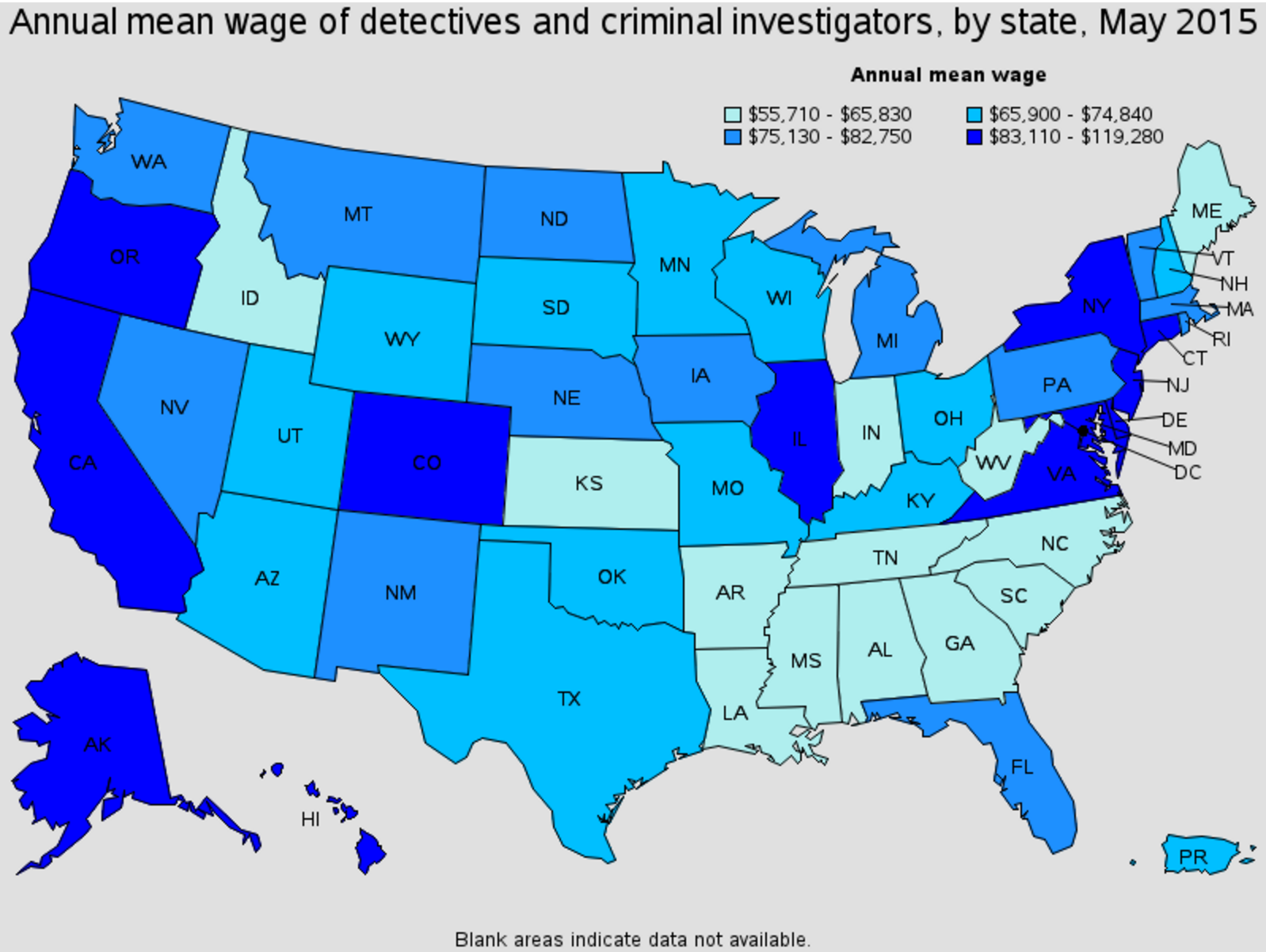
Job location
Crime rate and population of the place are closely related to the location. But there is another factor, which is the cost of living. If the place has higher cost of living, the detective’s salary will also be higher. Private investigators will also have this case. District of Columbia, Alaska, and New Jersey all pay 6-figure salaries with District of Columbia paying as much as $116,000.
Educational degree
A high school degree is sufficient for those who want any police job except for the federal level. States have different rules but a higher education certificate is not necessary in some states. But, the importance of higher education is considered by some states and departments that is why a degree after high school is a factor that affects the salary of the officers and detectives. This can be an associate, bachelor or a master’s degree. Depending on your degree, you might be paid more.
Number of years in the field
Your length of stay in the field will be a consideration on how much you will earn as an investigator. For those who are working in the field for 20 years already even if they are not promoted will get up to $15,000 increase. You can earn about $180,000 annually if you reach the post of Police Chief as a promotion.
Central Private Investigators
A private investigator’s salary depends on the number of cases he or she takes and solves. As mentioned before, the location can affect the price along with the many other factors such as the amount of discretion needed, the amount of danger involved, extra equipment required and many other things. Clients usually present their problem to the investigator and then it is up to them to quote a price for the job.
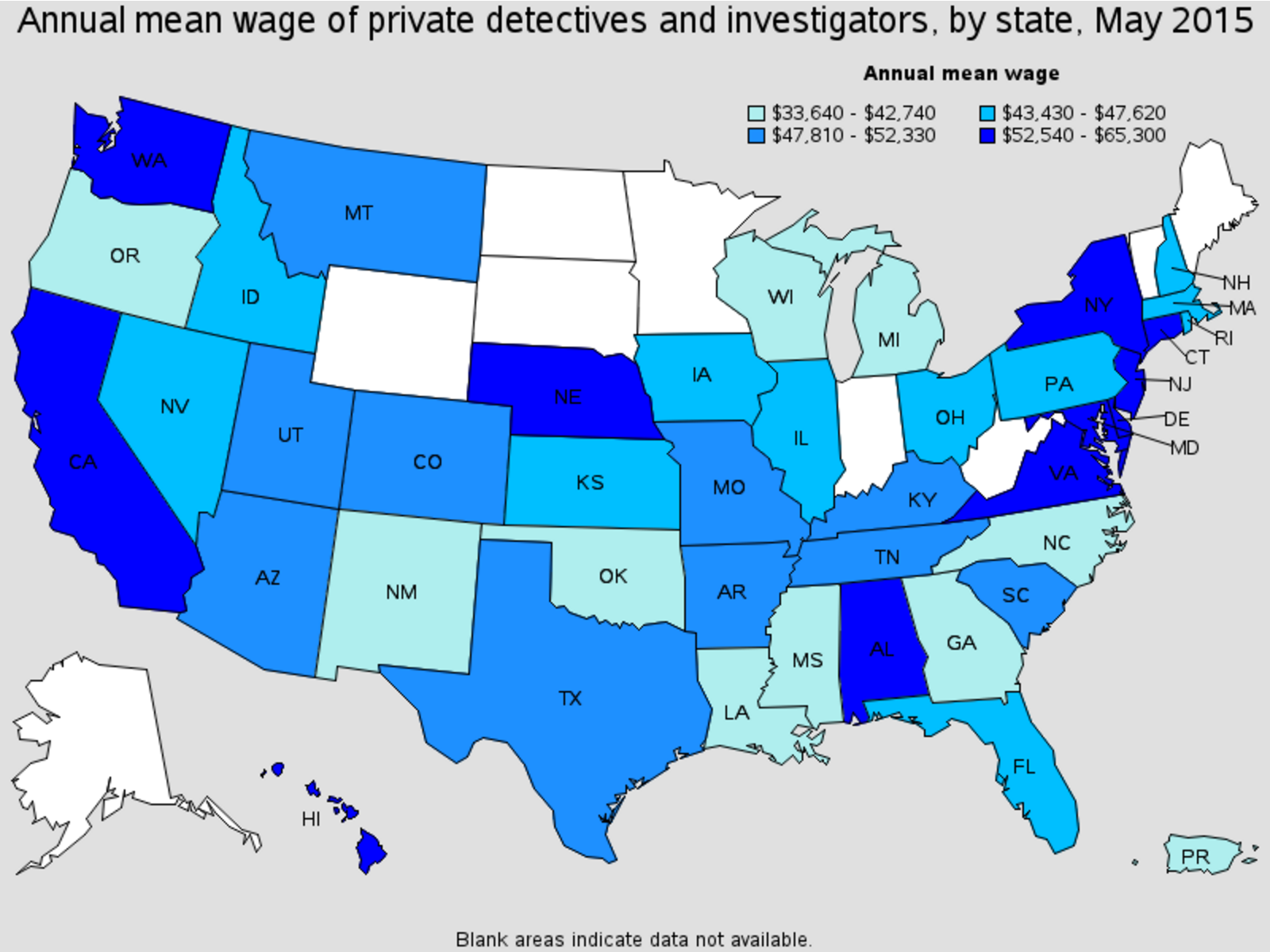
You will know here that a state-employed detective’s income is steady and through various means it can be increased. On the hand, the salary of a private investigator is quite unpredictable and can only be increased by fame (or rather being more discrete). The path to choose will be determined based in the financial facts you have.
Career Outlook of a Central Detective
First, let’s talk about the growth in the fields. There were about 106,000 public detectives or criminal investigators recorded in 2015. Meanwhile, private investigators who do the same job were only 30,000. There is a predicted growth of 5% in the industry of private detectives. This means that there will be about 1,500 new jobs open by 2025. Such growth rate follows the 5% average growth rate in all other sectors. This figure is only 4% for public investigators. This means there is going to be around 4,000 more jobs as a criminal investigator by 2025. This too is an average rate of growth.
[asd_program_button /]The employment increases steadily because the population increases. Protection should be done to a lot of people and more criminals should be caught as the population increases. Crime rate is not increasing significantly due to stricter laws and more advanced technology being used. Hence, there is a balance in each other, which leads to average growth in both careers.
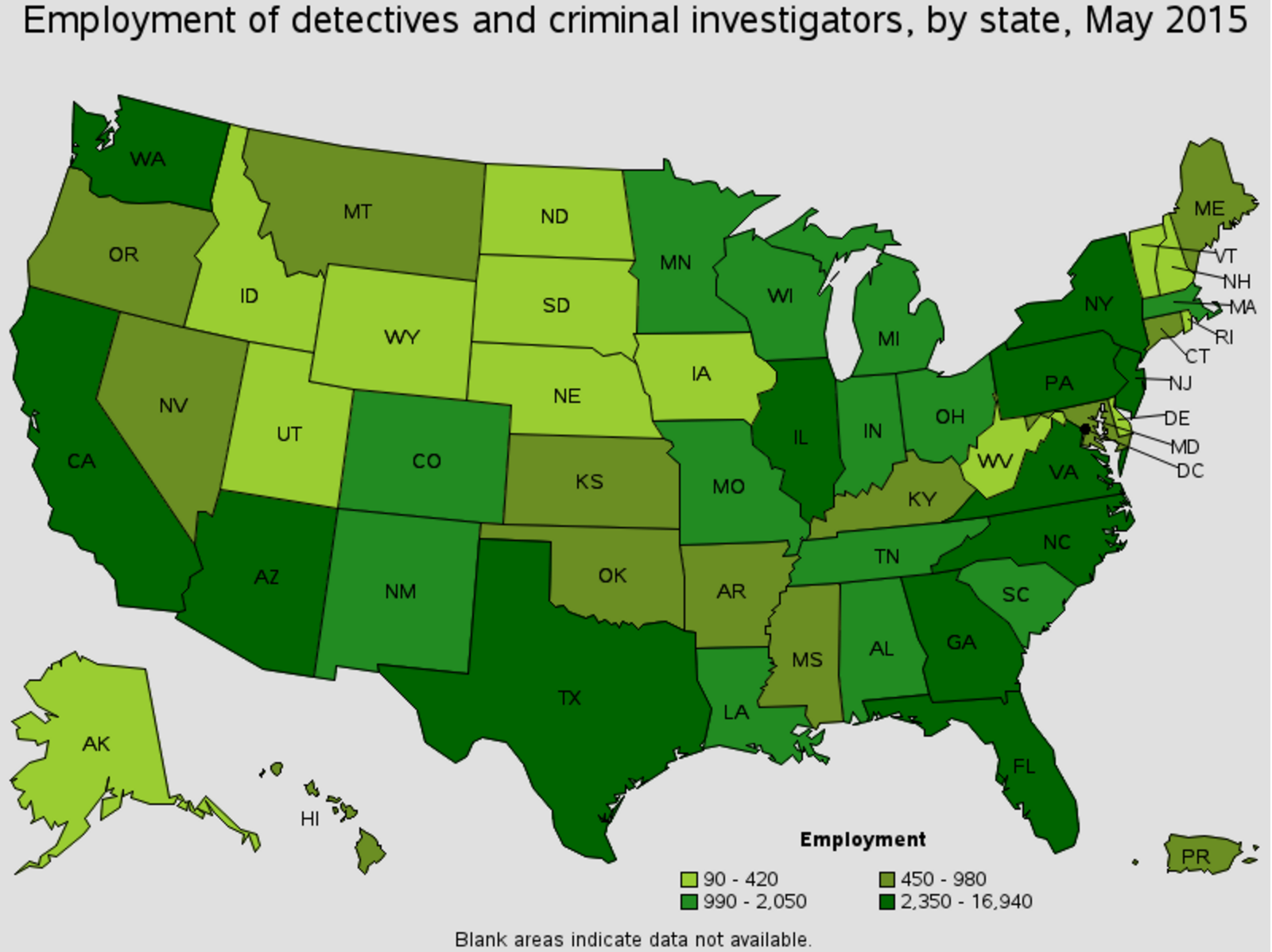
Geographically speaking, Texas, California and New York employ the highest number of Criminal / Law Enforcement Investigators. The employment in western states and Texas are higher that to that of the eastern parts. Private detectives are prominent in California, Texas and Florida with the southern states tending to employ more compared to the northern ones.
Let’s see what are the industries that hire these professionals most. As clear as day, The Local, State government and the Federal branch employ the most number of criminal investigators. Security Services, Consulting services are the ones who usually hire private detectives and the local government need them for consultation on a few cases.
When it comes to finance, criminal investigators are paid more compared to the private ones. The annual average salary of criminal investigators is $80,000 while Private investigators get $52,000. When combining the aspects of geography and finance, the District of Columbia, Alaska, and New Jersey is paying most the Public investigators. Private detectives receive higher payment in Alabama, Nebraska, and New Jersey.
Compared with the different industries, private industries where they employ most do not pay the highest. Private detectives are paid most in Electromedical, Navigational, Power generation, Metal Product forming and other such industries because of the most sensitive information that needs to be protected. For public investigators, they are paid most by federal agencies, postal services, and educational institutes.
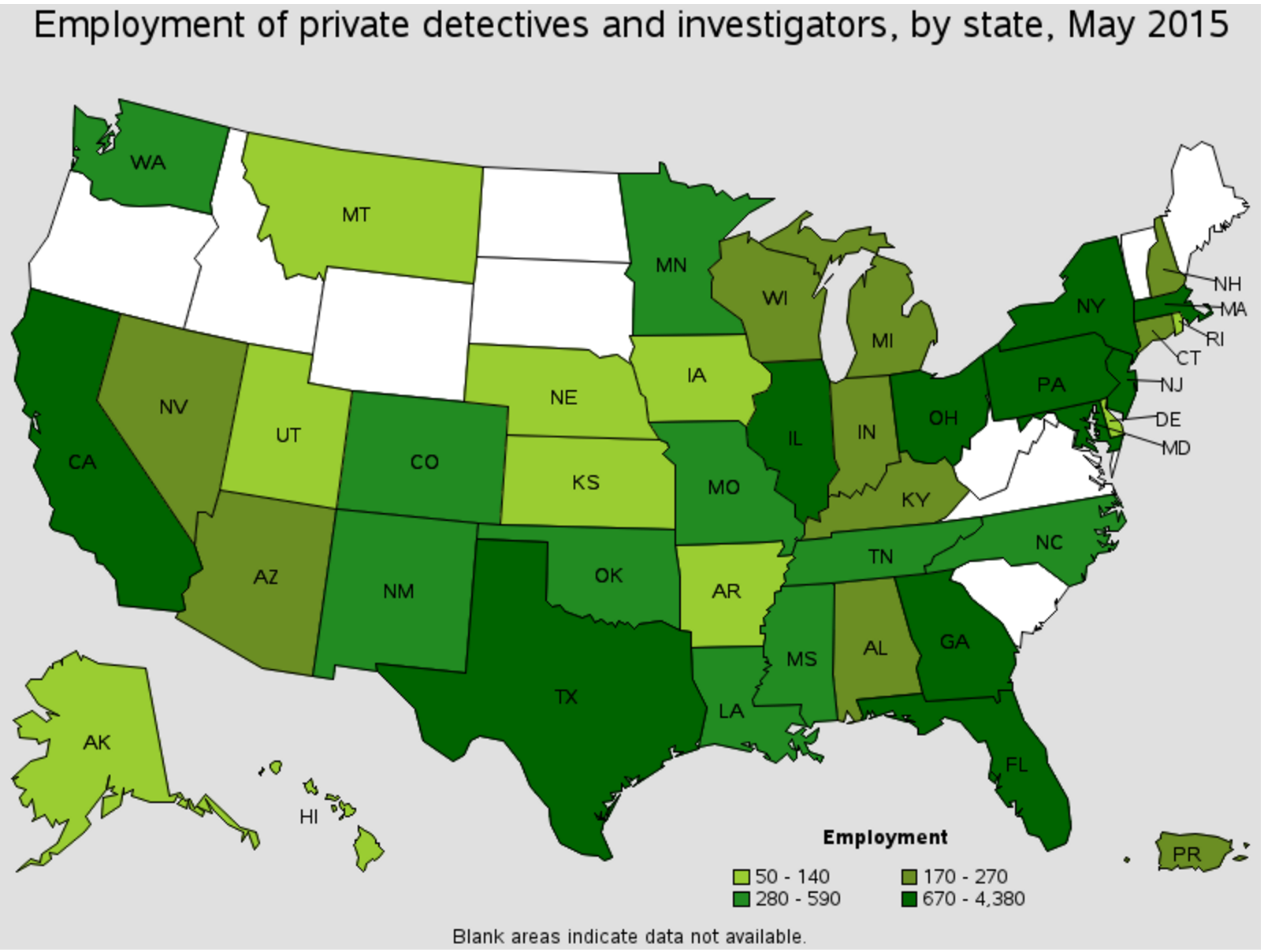
How To Become A Central Detective
Keep in mind that there are two kinds of detectives. General public can hire some private investigators to investigate certain things. There are those who are government employees and after being promoted as a police officer gets the post. We are going to explore here the different avenues.
[asd_program_button /]Be a High School Graduate
Due to excellent deduction skills, a deductive is able to take a leap from a police officer to a detective position. This only means that you will need to complete your high school studies and become a police officer before you can become a detective. Becoming a private investigator would mean getting a high school degree.
Get Yourself a Bachelor’s Degree
In most cases, enlisting in the police force won’t require a bachelor’s degree. Although some officers would like to have other means of employment right after retirement. Likewise, you will need a bachelor degree if you want to become a detective.
Many institutions require applicants to have a bachelor’s degree in law, criminal justice or psychology to become a detective. Anyone with an associate’s degree is given training up to 5000 hours. However, the time required is reduced to 4000 hours if you have a bachelor’s degree.
Get the right amount of experience
To become a professional detective (not employed by the state), you need to have some professional experience as an investigator. Fortunately, you have several options available. However, the most common way is to be employed by the government first. If you have any experience as an arson investigator, criminal investigator or a law enforcement investigator, you are qualified as a person with experience. Other than these, you can also choose to Public defender’s office investigator or a licensed repossessor.
The experience required might vary from one state to another. There are some that only require 3 years of experience, but some might need at least five.
Get firearms permits
Investigators that aren’t licensed by the state aren’t allowed to carry firearms without a permit. Some firearms require a full training course after which they are issued with the permits. Hence, to get a permit for your firearm when working as an investigator, you will need to complete the full training course.
Obtain South Carolina licensure
Once you have fulfilled the requirements, you will need to take a state licensing examination. This test usually contains some multiple choice questions about state laws and some procedures that often need to be carried out. This examination is only for aspiring private detectives. After passing this test, you are officially a private investigator with a license.
Get South Carolina Insurance
Due to the dangerous nature of the work, you should make sure to get an insurance. Typically, we’re talking about a $10,000 medical insurance. But since you’re carrying a gun with you for extra protection, and you will have to insure the gun as well, getting a higher amount will be an ideal choice.
Complete all these steps and then voila! You can finally fulfill your dream and become a detective! However, don’t forget that being a detective would mean exposing yourself to danger. If you want to pursue your dreams, learn all about the requirements and complete them as soon as you can.
Central Detective Job Description?
Crime Scene Investigation
One of the main duties of a detective is to analyze a crime scene and deduce certain assumptions from it. It will also include searching for clues and collecting evidences. They are supposed to take anything into custody that may look suspicious and may be used for clues or in the court later. To help them deduce a lot of things more quickly and easily, the forensic department will sometimes offer them assistance. To collect more clues and evidence, detectives will need to go door to door and ask any possible eye witnesses.
[asd_program_button /]Criminal Research
Doing research regarding previous cases is regarded as an important aspect of a detective’s job. This is so that they can have an insight regarding criminal patterns and behaviors. This involves looking into previous case records to allow them to have an insight regarding the behavior of the criminal. In cases of serial killers or ‘copycats’, research helps a lot. This also helps detectives take down drug cartels by allowing them to identify any tactics being used. Research also helps detectives make deductions more efficiently.
Narrowing down suspects
A detective’s main objective is to take the one at fault to justice. They will need to have a list of the suspects first before such thing could happen. In some cases, it could include over a hundred people, but there are also cases where there is none. They are able to come up with such list by piecing evidences, statements from eye witnesses, results from research, and a bit of forensics altogether. This suspect pool is then narrowed down by getting alibis from some suspects and interrogating others. With a narrowed down list, they will then have the suspects admit to their crimes.
Testifying In Court
As part of their final job, detectives will need to make sure justice is served. The court will sometimes summon the detective to the court to aid with the process. In some cases, they will describe the evidence and how they are connected to the suspect, as well as narrating the possible crime scene. Sometimes, the detectives are also required to escort the culprit to jail.
Central Private Detectives
The above duties are what a detective is expected to do. Keep in mind that the job of a private detective isn’t as easy as it seems. They will need to fulfill the needs of their clients especially when it comes to research. But there are limits which they shouldn’t go beyond when carrying out their duties. A private detective is usually hired to perform background checks, keep a check on the actions of certain people, track finances, collect evidence against someone or work of similar nature. They should never act in a way that they can be easily recognized as a detective in public. They are however, not allowed to arrest anyone.
You see, the “Idiot Box But the jobs that these detectives (private and public) must undergo daily are stressful beyond comparison. That is never shown properly on television or anywhere else. Supposedly, they should carefully collect any clue and evidence since they carry such heavy responsibility on their shoulders. If the job still has you intrigued, then find out how long it takes to become a detective now!
